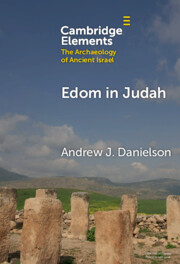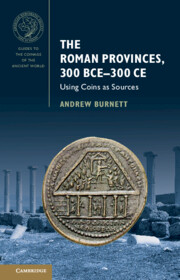Refine search
Actions for selected content:
24643 results in Ancient history

Edom in Judah
- Trade, Migration, and Kinship in the Late Iron Age Southern Levant
-
- Published online:
- 20 November 2024
- Print publication:
- 19 December 2024
-
- Element
- Export citation

The Roman Provinces, 300 BCE–300 CE
- Using Coins as Sources
-
- Published online:
- 14 November 2024
- Print publication:
- 14 November 2024
-
- Textbook
- Export citation
Figures
-
- Book:
- The Roman Provinces, 300 BCE–300 CE
- Published online:
- 14 November 2024
- Print publication:
- 14 November 2024, pp ix-xxvii
-
- Chapter
- Export citation
Copyright page
-
- Book:
- The Roman Provinces, 300 BCE–300 CE
- Published online:
- 14 November 2024
- Print publication:
- 14 November 2024, pp vi-vi
-
- Chapter
- Export citation
Boxes
-
- Book:
- The Roman Provinces, 300 BCE–300 CE
- Published online:
- 14 November 2024
- Print publication:
- 14 November 2024, pp xxix-xxx
-
- Chapter
- Export citation
Appendices
-
- Book:
- The Roman Provinces, 300 BCE–300 CE
- Published online:
- 14 November 2024
- Print publication:
- 14 November 2024, pp 304-312
-
- Chapter
- Export citation
Index
-
- Book:
- The Roman Provinces, 300 BCE–300 CE
- Published online:
- 14 November 2024
- Print publication:
- 14 November 2024, pp 347-362
-
- Chapter
- Export citation
Maps
-
- Book:
- The Roman Provinces, 300 BCE–300 CE
- Published online:
- 14 November 2024
- Print publication:
- 14 November 2024, pp xxviii-xxviii
-
- Chapter
- Export citation
5 - The Revolution of Augustus – and Becoming More Roman in the First Century
-
- Book:
- The Roman Provinces, 300 BCE–300 CE
- Published online:
- 14 November 2024
- Print publication:
- 14 November 2024, pp 129-173
-
- Chapter
- Export citation
Guide to Further Reading
-
- Book:
- The Roman Provinces, 300 BCE–300 CE
- Published online:
- 14 November 2024
- Print publication:
- 14 November 2024, pp 271-271
-
- Chapter
- Export citation
4 - Whose Coins? A Model for City Coinage in Imperial Times
-
- Book:
- The Roman Provinces, 300 BCE–300 CE
- Published online:
- 14 November 2024
- Print publication:
- 14 November 2024, pp 110-128
-
- Chapter
- Export citation
1 - Precious Metal Coinages at Rome and in the Provinces
-
- Book:
- The Roman Provinces, 300 BCE–300 CE
- Published online:
- 14 November 2024
- Print publication:
- 14 November 2024, pp 1-43
-
- Chapter
- Export citation
6 - Reinforcing Greek Identity in the Golden Age of the Second Century ce
-
- Book:
- The Roman Provinces, 300 BCE–300 CE
- Published online:
- 14 November 2024
- Print publication:
- 14 November 2024, pp 174-221
-
- Chapter
- Export citation
Bibliography
-
- Book:
- The Roman Provinces, 300 BCE–300 CE
- Published online:
- 14 November 2024
- Print publication:
- 14 November 2024, pp 272-303
-
- Chapter
- Export citation
2 - The Beginnings of an Empire in Italy and the Western Mediterranean (300–200 bce)
-
- Book:
- The Roman Provinces, 300 BCE–300 CE
- Published online:
- 14 November 2024
- Print publication:
- 14 November 2024, pp 44-76
-
- Chapter
- Export citation
Abbreviations
-
- Book:
- The Roman Provinces, 300 BCE–300 CE
- Published online:
- 14 November 2024
- Print publication:
- 14 November 2024, pp xlii-xlii
-
- Chapter
- Export citation
7 - ‘From a kingdom of gold to one of iron and rust’ in the Third Century ce
-
- Book:
- The Roman Provinces, 300 BCE–300 CE
- Published online:
- 14 November 2024
- Print publication:
- 14 November 2024, pp 222-270
-
- Chapter
- Export citation
Contents
-
- Book:
- The Roman Provinces, 300 BCE–300 CE
- Published online:
- 14 November 2024
- Print publication:
- 14 November 2024, pp vii-viii
-
- Chapter
- Export citation
Notes
-
- Book:
- The Roman Provinces, 300 BCE–300 CE
- Published online:
- 14 November 2024
- Print publication:
- 14 November 2024, pp 313-346
-
- Chapter
- Export citation
Acknowledgements
-
- Book:
- The Roman Provinces, 300 BCE–300 CE
- Published online:
- 14 November 2024
- Print publication:
- 14 November 2024, pp xxxix-xxxix
-
- Chapter
- Export citation
